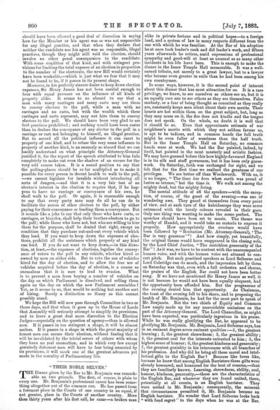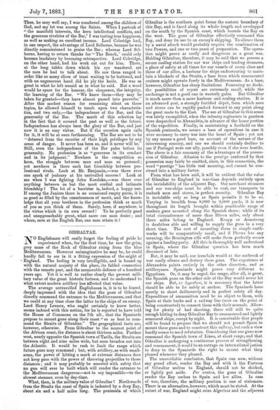"THEIR NOBLE SELVES." T HE Dinner given by the Bar to
Mr. Benjamin was remark- able on two grounds. The first, of course, is plain to every one. Mr. Benjamin's professional career has been some- thing altogether out of the common run. He has passed from a foremost place in the Courts of one country to an equal, if not greater, place in the Courts of another country. More than thirty years after his first call, he came—a broken man
alike in private fortune and in political hopes—to a foreign land, and a system of law in many respects different from the one with which he was familiar. At the Bar of his adoption he at once took leader's rank and did leader's work, and fifteen years afterwards he retires, amid expressions of professional sympathy and good-will at least as unusual as so many other incidents in his life have been. This is enough to make the dinner in the Inner Temple Hall memorable. It was a well- earned tribute, not merely to a great lawyer, but to a lawyer who became even greater in exile than he had been among his own countrymen.
In some ways, however, it is the second point of interest about this dinner that has most attraction for us. It is a rare privilege, we know, to see ourselves as others see us, but it is an equally rare one to see others as they see themselves. False modesty, or a fear of being thought as conceited as they really are, constantly keeps men silent about their own merits. Their hearts are hot within them on the great subject, but, long as they may muse on it, the fire does not kindle and the tongue does not speak. On the whole, no doubt it is well that it should be so. Even that approximate estimate of our neighbour's merits with which they not seldom favour us, is apt to be tedious, and in common hands the full truth might be even fuller of weariness than the half truth. But in the Inner Temple Hall on Saturday, no common hands were at work. We had the Bar painted, indeed, by itself, but painted in the most masterly and artistic fashion. We may have guessed before this how highly-favoured England is in its silk and stuff gownsraen, but it has been only guess- work. On Saturday, faith was exchanged for sight, and we felt that for the first time we realised the greatness of our privileges. We are better off than Wordsworth. With us, it is no longer, "The time has been when earth was proud of lustre so intense," but the time is. We walk not among the mighty dead, but the mighty living.
The mental attitude of all the speakers—with the excep- tion, of course, of the guest of the evening—was one of wondering awe. They gazed at themselves from every point of view, and at each turn of the kaleidoscope they were more entranced with the lovely colours revealed to their gaze. Only one thing was wanting to make the scene perfect. The speeches should have been set to music. The theme was worthy of Handel, and it would take an oratorio to express it properly. How appropriately the overture would have been followed by "Recitation (Mr. Attorney-General), 'The Bar is very generous'"! And how simply, yet beautifully, the original theme would have reappeared in the closing solo, by the Lord Chief Justice, "The matchless generosity of the Bar" I As it was we have to be content with the unaccompanied human voice, and with the human voice not attuned to con- cert pitch. But such practised speakers as Lord Selbome and Lord Coleridge can do much, and the impression left by them on Saturday was that, even with a full orchestra and chorus, the praises of the English Bar could not have been better sung. If we have not mentioned Sir Henry James as well, it is not because he would not have been equally eloquent, had the opportunity been afforded him. But the programme of the evening denied him that opportunity. As Chairman, the toast of the evening fell to his share, and in proposing the health of Mr. Benjamin, he had for the most part to speak of Mr. Benjamin. But the two chiefs of Equity and Common Law amply made up for any unavoidable omissions on the part of the Attorney-General. The Lord Chancellor, as might
have been expected, was particularly ingenious in his praise. While he was really glorifying the Bar, he appeared to be glorifying Mr. Benjamin. Mr. Benjamin, Lord Selbome says, has in an eminent degree seven eminent qualities :-1, the greatest learning ; 2, the greatest shrewdness ; 3, the greatest ability ; 4, the greatest zeal for the interests entrusted to him ; 5, the highest sense of honour; 6, the greatest kindness and generosity; 7, the greatest geniality in his intercourse with all branches of his profession. And why did he bring all these moral and intel- lectual gifts to the English Bar? Because like loves like, because he knew that among English barristers these gifts were already honoured, and honoured for the beat of reasons,—that they are familiarly known. Learning, shrewdness, ability, zeal, honour, kindness, generosity,—these are the characteristics of the English Bar, and wherever they are found united, there, potentially at all events, is an English barrister. They were united in Mr. Benjamin ; consequently, the moment that circumstances permitted it, Mr. Benjamin became an English barrister. No wonder that Lord Selbome looks back "with fond regret" to the days when he was at the Bar.
Then, he may well say, I was numbered among the children of God, and my lot was among the Saints. When I partook of "the manifold interests, the keen intellectual conflicts, and the generous rivalries of the Bar," I was tasting true happiness, as well as making an excellent income. Lord Coleridge had, in one respect, the advantage of Lord Selborne, because he was directly commissioned to praise the Bar ; whereas Lord Sel- borne, having to return thanks for "The Bench," could only become laudatory by becoming retrospective. Lord Coleridge, on the other hand, had his work cut out for him. There, at the long tables down which his eye wandered, sat the men he had to talk about. He saw them ranged in order like so many slices of toast waiting to be buttered, and with no ungenerous hand did he ply the knife. He was as great in what he left unsaid as in what he said. Not a word would he spare for the honour, the eloquence, the integrity, the learning of the Bar. "We know them—they may be taken for granted—they have almost passed into proverbs." After this modest reason for remaining silent on these topics, he allowed himself to touch upon two characteris- tics, and two only,—the independence of the Bar, and the generosity of the Bar. The merit of this selection lay in the fact that it covered the past as well as the future. Independence has always been the glory of the Bar, and just now it is an easy virtue. But if the occasion again calls for it, it will be at once forthcoming. The Bar are not to be "deterred from the exercise of their high privileges by any sense of danger. It never has been so, and it never will be." Still, even the independence of the Bar pales before its generosity. No profession is so "generous in its conduct and in its judgment." Nowhere is the competition so keen, the struggle between man and man so personal ; yet nowhere is there such fast friendship between pro- fessional rivals. Look at Mr. Benjamin,—was there ever one spark of jealousy at his unrivalled success? Look at me when I was fighting John Karslake,—was there ever anything between us but the most cordial and intimate friendship The lot of a barrister is, indeed, a 'happy one. If among the Juniors there is an occasional empty purse, it is as good as filled by the consciousness of merit, and the know- ledge that all your brethren in the profession think as much of you as you think of them. Surely, here, if anywhere, is the virtue which is its own reward ! To be perfectly good and unapproachably great, what more can man desire ; and where, save at the English Bar, can man attain it ?



































 Previous page
Previous page